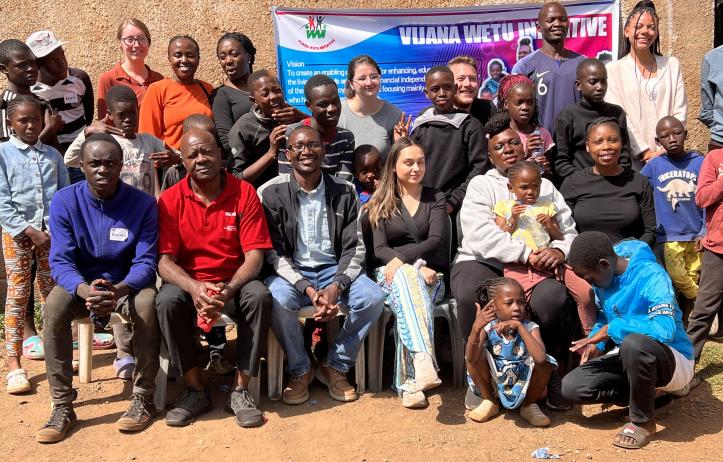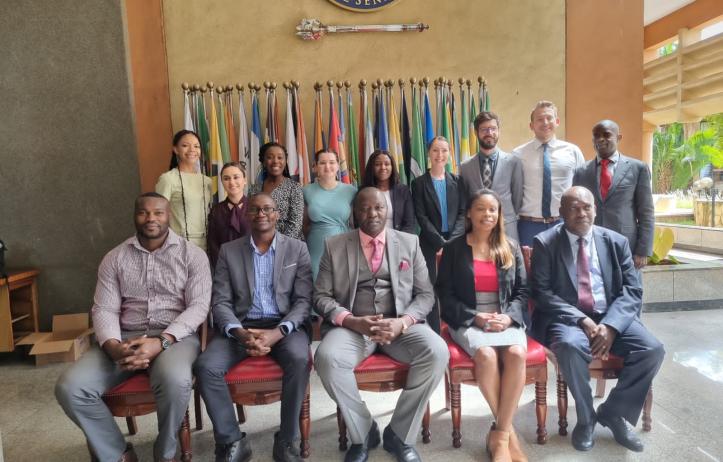Korbel students bridge knowledge gap in Nairobi
A thing that comes with studying international relations at a school within the US, is the potential to pull issues out of their regional contexts. US foreign policy often affects places policymakers know very little about beyond the CIA’s World Fact Book, and nowhere is this more evident than on the African continent. It’s an enormous area to neglect when it comes to implementing foreign policy, particularly when the nuances that are necessary for effective policy are disregarded, if not ignored.
This was the knowledge gap that Professor Singumbe Muyeba and Visiting Teaching Assistant Professor and Africa Center Director Abigail Kabandula sought to fill when they began bringing graduate students from Korbel to the University of Nairobi for a month during winter break. For Professor Muyeba, the focus of the trip was to help students understand the African context through research and experiential learning. “Decisions are being made by people who don’t know the context of Africa very well. Stock treatment has enormous consequences, if people understood the African context better, they could make more informed decisions.” It’s valuable to send people not only into US foreign policy, but into think tanks, nonprofits, and every sector of government who have a grounded understanding of what the African context is.
The trip was created to be an immersive experience– a way to get to know local circumstances better and connect with students and faculty from the University of Nairobi. Each week students had a three-hour seminar that cumulated in a presentation and research report where each student had the opportunity to present what they learned throughout the course. It was the opportunity to do this research, however, that was the difference between simply visiting Nairobi, and beginning to understand it in a deeper sense that can’t be learned in a classroom.
Students worked with academics and professionals on their research projects throughout the entirety of the trip. Two students worked with Professor Maria Nzomo on her research on what makes a woman leader successful, while two other students worked with Dr. Patrick Maluki on China’s Belt and Road Initiative and large scale infrastructure in Kenya, as well as helping him develop teaching pedagogy on international affairs and diplomacy. Three students organized focus groups with 21 young adults in Kibera– the largest slum in Africa and one of the largest in the world– to study the social economic needs of that population.
Micaela Parker was one of the students who got to partake in the trip to Kenya. As a second-year public policy graduate student she found the time there invaluable to her study of policy and international relations. She worked with Professor Maria Nzomo, Kenya’s former ambassador to the UN in Geneva, on creating modules that empowered women leaders. Micaela recalled, “We recognized that what we were learning wasn’t only impacting communities in Kenya, we could see the similarities in other countries.” The impact of her research and her experience in Nairobi reaches beyond the country’s borders. In her role as a legislative aid, Micaela wants to continue centering African issues, even in local law. “No matter where I am in life, I’m centering and advocating for the rights and dignity of the African diaspora and the Kenyan people.”
Micaela looks at being a lifelong learner as not simply the process of learning, but that of unlearning as well, “The more we engage in social constructs, the more we learn how much we don’t know. One month in Kenya and we’ve already decentered whiteness, it’s only helped me become a future policy maker and a better advocate on issues of international affairs.”
Ben Gavin was another student who had the opportunity to study in Nairobi. His work centered on mega-projects by analyzing their usefulness and understanding the externalities behind them. Specifically, his research focused on the Nairobi Expressway and the effect of its Chinese funding as a Belt and Road project. One of the things he came to understand from the research was how economic policy impacts communities in real life. “When you create an economic policy, there’s always going to be unintended consequences, and if you’re not there in person, and you don’t know how it operates, then you’re not able to think clearly about the unintended consequences of enacting a policy.”
Ben’s goal is to become a professor and wants to focus his research on development. “This is part of what creates Korbel– what other university can you do it in? This experience is so valuable to training as a professor, without it, I feel like I’m not teaching holistically. It’s essential to personal career growth.”
Understanding a context takes time, but doing meaningful and informed research, building connections with locals, academics, and students, and exploring a community and its customs help create that crucial understanding. There are some things that people can’t learn in a classroom. Professor Muyeba recalled being invited to both the Senate and the National Assembly. “A lot of the learning was the diplomatic protocol; how to act, what the order was, what to do when your name is called.” And indeed, names were called. Both the professors and each one of the students’ names were recognized by speakers in both the Senate and the National Assembly as members of the Josef Korbel School of International Studies. “It was probably the highlight of my academic career thus far,” Dr. Muyeba recalled, “I was very proud of the students and proud to be flying under the Korbel flag.”
Putting people into the world of policy, government, or nonprofits, with an understanding of an African context is crucial to being a school of international studies. “It’s a once-in-a-lifetime opportunity,” Parker says, “I’ve never been able to do international research on communities that I’ve cared about while also unlearning the context in which I’ve been taught to learn in the US. Opportunities like this, for students, only help them to think and rethink what their path in life can look like.”
The research practicum in Nairobi is funded by Dr. Phyllis and Jan Updike, Dr. Paul Docktor, and the Liebich Family
This article was written by Korbel Student David Kelm.




